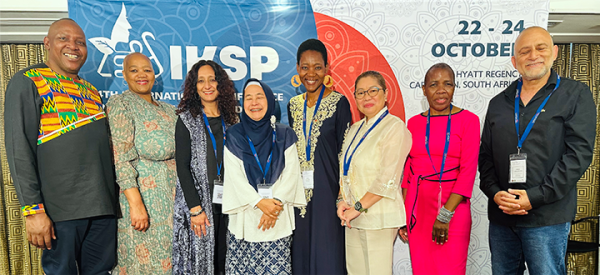College of Human Sciences
Conference a platform for critically engaging with indigenous knowledge-making
Co-hosted by Unisa, the 4th International Conference on Indigenous Knowledge Systems and Practices commenced on 22 October 2024, at the Hyatt Regency in Cape Town. This prestigious event brought together scholars, practitioners, students, artists and activists from around the world. The conference served as a platform for critically engaging with knowledge-making and the philosophical underpinnings of knowledge production.

From left: Prof Thinandavha Mashau (Deputy Dean, College of Human Sciences [CHS]), Prof Zethu Nkosi (Executive Dean, CHS), Prof Shahnaaz Suffla (Head: ISHS), Prof Elli Nur Hayati (Ahmad Dahlan University), Prof Puleng Segalo (Incumbent, Chief Albert Luthuli Research Chair), Prof Teresa G. de Guzman (University of the Philippines), Prof Azwihangwisi Mavhandu-Mudzusi (Director, School of Social Sciences) and Prof Haidar Eid (University of Al-Aqsa and University of Johannesburg)
In her opening address, Prof Shanaaz Suffla, Acting Head of the Institute for Social and Health Sciences (ISHS), said she is honoured to co-host the occasion alongside esteemed partners: Prof Elli Nur Hayati (Universitas Ahmad Dahlan, Indonesia) and Prof Teresa De Guzman (University of the Philippines). Suffla emphasised ISHS's commitment to advancing critical academic discourse and fostering enduring networks supporting indigenous knowledge systems globally.
The Executive Dean of the College of Human Sciences, Prof Zethu Nkosi, warmly welcomed esteemed guests, with greetings in various languages. Nkosi encouraged attendees to embrace curiosity, transdisciplinarity and critical engagement with knowledge practices and systems.
Prof Puleng Segalo, incumbent of the Chief Albert Luthuli Research Chair, delivered the keynote address, titled "On Mourning and Dreaming: Reimagining and Reclaiming Our Sense of Being".
Segalo commenced her address by reflecting on the tragic incident involving the five Soweto children who lost their lives after allegedly consuming snacks from a spaza shop. This poignant introduction set the tone for her thought-provoking discussion, which explored themes of community well-being and social justice.
Segalo said the Soweto incident is a scene that repeats itself where young people’s lives are cut short. "It is shocking how quickly we move on," she said. "How are we not horrified, how are we not having a national moment of mourning for losing so many children all at once? What does this mean for who or what we have become as a people?"
Segalo linked this scene with the formation of her home town in Zamdela, just outside Sasolburg in the Free State. She said Zamdela was part of a well-thought-out strategy by the apartheid government with the assistance of a French town planner, who studied the direction of the wind to determine who should be situated where. She further explains that black people were placed in a location where Sasol chemicals from the plant would be directed to where they lived. She painted this as a well-planned process of slowly poisoning black people.
She said many people from Zamdela struggle with respiratory issues as a result of the chemicals released by Sasol plant. "To me," she said, "convenient ignorance is when we assume that things have fundamentally changed in a country like South Africa. That it is possible to just move on, when physically, psychologically and spiritually we are killed every day."
Segalo argued that when colonial legacies are marked in one’s body, one cannot afford to give space to convenient ignorance. She further raised two questions, asking: “How do we understand the absence when the material gains and access to resources continue to be skewed in favour of the colonial masters? How do we envisage psychological well-being and healing when so many continue to carry the colonial wounds that manifest in everyday encounters?”
Day 2 of the conference featured a poignant address by Palestine activist, Prof Haidar Eid from the Al-Aqsa University and University of Johannesburg, who shared his compelling personal experience of living in Gaza. Eid emphasised the unwavering resilience of Palestinian people, steadfast in their resistance against apartheid. He underscored their unrelenting pursuit of justice, calling for the implementation of United Nations Resolution 194.
The conference concluded on 24 October 2024.
* By Nnana Martina Jege, Communication and Marketing Specialist, College of Human Sciences
Publish date: 2024/10/24

 Unisa co-hosts G20 community outreach in the Eastern Cape
Unisa co-hosts G20 community outreach in the Eastern Cape
 Unisans gain membership of prestigious science academies
Unisans gain membership of prestigious science academies
 Advocating for disability transformation through servant leadership
Advocating for disability transformation through servant leadership
 Unisa Press continues to illuminate the publishing space
Unisa Press continues to illuminate the publishing space